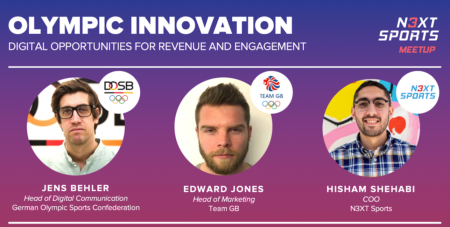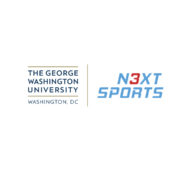
The postponement of the Tokyo 2020 Olympic Games had a massive effect on the whole Olympic Movement. Stakeholders across the board, from athletes to National Olympic Committees (NOCs), to sponsors, to the Organizing Committees of other Olympic Games, the International Olympic Committee, are re-evaluating plans, budgets, commitments, and contracts.
It is an uncertain time, which calls for even greater dialogue between all stakeholders.
This was the starting point for our Olympic Innovation online meetup which took place on the 23rd of April. Entitled Digital Opportunities for Revenue & Engagement, we had the pleasure of hosting Edward Jones from Team GB and Jens Behler from the German Olympic Sports Confederation. The response by NOCs from around the world has been very positive, who found the insights even more useful due to the similarities between them and the speakers’ organizations.
The discussion took us through different stages of their digital transformation journeys, looking at the specificities of Olympic marketing initiatives and opportunities for NOCs. Importantly, the COVID-19 context has brought new challenges to them, as well as a more focused approach to investing their digital marketing budgets. Finally, the discussion touched on data and the importance of a data-driven digital strategy, and how this can bring value to partners and other stakeholders.
The Olympic marketing context
The Olympic Games, the biggest sporting event, happens every 2 years and the buzz generated right before and after the Games is massive in comparison to the low visibility and interest in the rest of the period between each edition. The NOCs must be more creative in creating campaigns, initiatives, and activities to keep fans and partners engaged, using the few Olympic assets they have at their disposal within their geographies, and generating new commercial assets and opportunities.
¨The Olympics are always a big moment for us where we can see what we are capable of doing on our social media channels and to get the whole country behind our team and tell them the stories of our athletes through our social media channels and it works during the games. But for us, it’s hard to do the same approach when it’s not Olympic Games time¨.
Digital transformation of a NOC
Team GB started its digital journey by focusing on a content-driven strategy, giving greater importance to the storytelling of stories of Olympians and the entourage around them. Following a very successful Rio 2016 Olympic Games, they took advantage by developing new assets such as the “I Am Team GB” mass participation series. This allowed them to create more content, and drive greater engagement with their partner-supported content. With a greater capacity to tell stories and keep the Olympic flame alive, Team GB had a direct and personal communication approach with fans via email. All this was possible through working with external experts on their digital strategy.
¨Working with an external partner helped us set up our digital strategy and implement it in order to drive higher revenue for the organization¨
Going through a digital transformation process should not apply only to one department but to the entire organization as it optimizes processes for the organization. Jens Behler shared how implementing the digital transformation process is part of their overall strategy.
Digital as a revenue generator
During crucial times like the one we are going through the only way to keep engaged with the community is through digital platforms. As such, the groundwork set up by Team GB and DOSB has allowed these 2 NOCs to continue to service their commercial partners, keep fans engaged, and maintain a presence in a crowded content space.
¨By building and launching new digital activities, we are giving ourselves and our partners an opportunity to extend additional brand value¨– Edward Jones.
Both, Team GB, and the German Olympic Sports Confederation have taken this time to develop closer relations with their athletes, to involve them into content creation, and to launch new digital campaigns and initiatives. Team GB has launched a new TikTok campaign where they encourage fans and athletes to create content at home by recreating their version of the Olympics in their homes.
Athletes are part of the digital strategy
Athletes are a great source for content creation, and most of the time their power to communicate has a broader reach than the organization they represent. In our 2019 Trends in Sport technology report, we identified a very popular trend that we named Athletes Inc. Athletes are becoming their own brands, setting up their own companies, becoming investors in many cases. We saw that happening a lot in the United States over the last few years, and it’s now permeating other regions as well.
¨As a National Olympic Committee we only interact physically with our athletes during the Olympic Games, but now with all the digital opportunities available we can interact every day. A lot of our athletes are much more powerful as a brand than us as a team, so we always have to put them in context¨. – Jens Behler.
Data strategy is key for success
Talking about digital we cannot leave behind the power of data. Data is the new oil, and sports organizations operating in the sports industry need to adopt a data-driven decision making philosophy to navigate these uncertain times. By gathering data, sports organizations can hyper personalize their approach to each of their fans, delivering what they want, when they want it, where they want it, whether it is a piece of content, an event, a piece of merchandise, or a way to engage with the brand.
¨We see data and a CRM specifically, as as an opportunity for us to better provide fans with the type of content that we that we’re producing, and build deeper relationships and engagement with our fan base¨ – Edward Jones
Understanding the power of implementing a digital strategy in place is one of the first steps, but one cannot do it without the support from the leadership team. With this important step in place, the mindset of the organization changes and allows for a culture change that looks at the opportunities that digital can bring. Some months ago, the German Olympic Sports Confederation, saw the need to track down data live in order to make better decisions as an organization. They created a social hub inside the company to create content, but also to look at the data live.
¨It helps us to get all the digital awareness within our company, but also to work closely together with the marketing and commercial department, among others¨. – Jens Behler
Thank you to Edward and Jens for being so kind as to share their insights with us. It has been hugely satisfying to the whole community.
How is your organization approaching its digital transformation journey during this period? Are you considering how to develop your data lake or data strategy? Get in touch with our teammate Javier at javier@n3xtsports.com to find out more about our digital readiness assessment that can help you define your benchmark today.
If you were not able to make it to our online session, you can watch it here, also we would like to invite you to subscribe to our newsletter, and follow us on Linkedin, Twitter, and Facebook to stay up to date with any N3XT Sports news.



